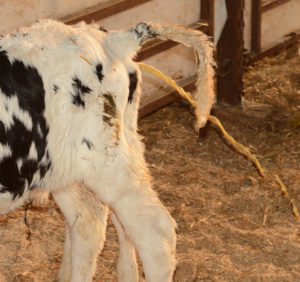Healthy Calf Conference
Follow to stay up-to-date on all Healthy Calf Conference updates. Speaker announcements, sponsorship information, registration announcements, and more.
Neonatal calf diarrhea, also known as scours, is one of the most common calfhood illnesses and can be a big problem for producers. Calf scours are caused by viruses, bacteria, parasites, or can be brought on by stress, but not by feeding too much milk or milk replacer. This is a common misconception, calves do not scour because they were fed too much, calves scour because they were exposed to disease-causing bacteria or viruses.

Scours can prove to be deadly for young calves as they experience rapid loss of water and electrolytes and quickly dehydrate.
The timing of the onset of scours can tell you a lot about how the calf got sick. If a calf becomes sick in the first five days of life, the infection most likely happened in the maternity pen. If calves become sick once they’re more than seven days old, they were likely exposed to infection in the calf pen. Finding out where the calf was exposed can highlight the need for improved cleanliness in either the calving area or the calf pens.
Early signs of illness can be subtle but include changes in the calf’s demeanor or posture. A sick calf may appear depressed, lethargic, have droopy ears, is reluctant to stand or drink, and has a poor suckle response. When caught early and provided with oral electrolytes scours can be prevented, or the severity can be reduced. Developing a protocol for electrolyte administration with your herd veterinarian can help ensure that all sick calves are treated promptly.
If a calf is scouring, you must not skip any milk feedings. If the calf does not want to drink, it is important to keep frequently offering small feedings as the calf will die without the energy it gets from milk or milk replacer, especially in temperatures below 10oC. Calves off milk or milk replacer longer than 48 hours can become lactose intolerant as the cells producing lactase are lost.
In addition to milk or milk replacer, it is important to offer the calf two to four liters a day of an oral electrolyte solution. This can be fed one hour after milk or milk replacer but not mixed together, as can become dehydrated and needs all the fluid it can get. Further, combining milk replacer and some electrolyte solutions can create a dangerously high sodium concentration. Your herd veterinarian can help you create a protocol that determines what electrolyte solution and feeding schedule is right for you and your calves.
Treatment of scours is mainly supportive since some infections do not respond to medications. The best you can do for sick calves is keep them comfortable and hydrated. Consult your veterinarian regarding the use of antibiotics. Your veterinarian can help you diagnose the pathogens that are causing scours on your farm and create targeted treatment and prevention plans. Using the right antibiotic and disinfectant for the bacteria on your farm is key to helping sick calves recover and preventing further scouring and antimicrobial resistance. Viruses cannot be cured by antibiotics. Using antibiotics against a virus is costly, can increase antimicrobial resistance, and will not help the calf. If a virus is causing scours, support the calf with rehydration and ask your herd veterinarian if cleaning or vaccination could help prevent future cases.
Calf scours are highly preventable. The focus of your calf management should be on prevention rather than reaction. Taking a proactive approach to dealing with calf scours can save a lot of time and money in the long run by preventing the additional costs of labor, treatments, and growth lags.
Preventing scours should start by ensuring all calves are provided with good quality colostrum as soon as possible after birth. Developing cleaning schedules and protocols for calving areas and calf pens and ensuring all buckets, nipples and bottles are properly cleaned and disinfected daily is very important. Calves should be checked at least twice daily for signs of illness.
Veal Farmers of Ontario has also developed a calf health cheat sheet available here, to help quickly identify the signs of a sick calf. When working with calves, you should always start with the youngest ones first, followed by the older calves, then sick calves. This helps to avoid passing diseases from the older ones to the younger ones or from sick ones to healthy ones. While scours in young calves is common, it should not be considered normal. Work with your herd veterinarian to create protocols to manage scouring calves and to identify potential changes to your calf management that can prevent this common ailment.
Follow to stay up-to-date on all Healthy Calf Conference updates. Speaker announcements, sponsorship information, registration announcements, and more.
The Codes of Practice are nationally developed guidelines for the care and handling of farm animals. They serve as our national understanding of animal care requirements and recommended practices.